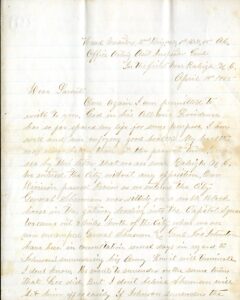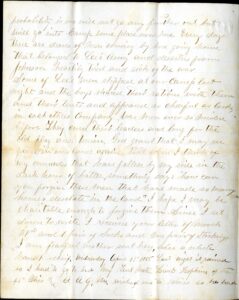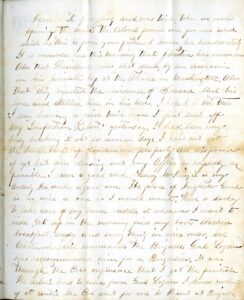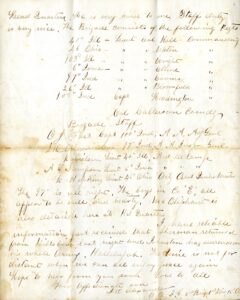Andrea has since graduated and moved on, but she left us with some of her amazing blog posts ready to go! Congratulations to Andrea and we think we convinced her that archives is where she wants to be!
You may recall this post by Katie Martin from summer of last year about John D. Alexander, an 1861 alumnus of IU and later Union Captain during the Civil War. Over the past week or so, I’ve been transcribing all of the Civil War letters in Alexander’s collection, including the one that Katie included in her post. It’s been a real treat to read these as the letters definitely provide some unique insight into war strategies, the day-to-day life and sentiments of soldiers, and the means of communication during the mid-19th century. As an American History major, the Civil War has been a topic of particular interest to me for some time. So getting to read a primary source not already heavily picked over by historians is exciting, to say the least.
You can read some of Alexander’s biographical information in Katie’s post. By the end of the war, he was serving as an Acting Assistant Inspector General of the Second Brigade under William Tecumseh Sherman’s army. His brigade marched into Raleigh, North Carolina in April of 1865. On April 9th, 1865, General Robert E. Lee surrendered to Ulysses S. Grant in Virginia, a significant marker that indicated the war was almost over. By the time John Alexander was writing a letter to his parents on April 18th, Sherman had been in Raleigh having an ongoing negotiation with General Joseph Johnston about the terms of another Confederate surrender. Johnston’s surrender turned out to be the largest surrender of men during the entire war with 89,270 soldiers in all.
Here’s John Alexander’s account of how it all unfolded:




And here’s a partial transcript, since that’s pretty difficult to read:
Once again I am permitted to write to you. God in his all-wise providence has so far spared my life for some purpose. I am well and am enjoying good health. My health was never better than at the present time. You see by this letter that we are near Raleigh N.C. We entered the city without any opposition. Our Division passed review as we entered the city. General Sherman was sitting on a noble black horse in the gateway leading into the Capitol Square. We came out 3 miles north of the City where we are now encamped. General Sherman and Genl. Joe Johnston have been in consultations several days in regard to [Johnston’s] surrendering his Army. How it will terminate I don’t know. He wants to surrender on the same terms that Lee did. But I don’t believe Sherman will let him off so easily. If [Johnston] surrenders the probability is we will not go any further out but will go into Camp some place near here. Every day there are droves of men coming by here going home that belonged to lee’s Army and deserters from [Johnston] heartily tired and sick of the war. Some of Lee’s men stopped at our Camp last night and the boys shared their rations with them and their tents and appeared as cheerful as larks in each others company. Was man ever so [illegible] before. They curse their leaders and long for the old flag and Union. God grant that I may see peace in our land again. But when I think of my comrades that have fallen by my side in the dark hour of battle, something says “how can you forgive these men that have made so many homes desolate in the land”. I hope I may be charitable enough to forgive them…
Wednesday April 19th 1865
Last night it rained so I had to go to bed. My tent mate, Lieut. Hopkins of the 46th Ohio and A.A.G.M. wished me to retire as he had been out foraging and was tired. When we were opening the mail the Colonel found one for me and said “this is from your father I know his handwriting.” It is rumored here this morning that Johnston has surrendered. Also that President was shot dead by an assassin in his private box at the Theatre in Washington. Also that they visited the residence of Seward, shot his son and stabbed him in his bed. I hope it is not true…
I have reliable information just received that Sherman returned from Hillsboro last night and Johnston has surrendered his whole Army. Hallelujah. The time is not far distant when we can all enjoy peace again.
I personally learned a lot from this letter alone about the ambiguity in those few days when no one was quite sure of whether or not the war was really over. The Union soldiers weren’t entirely sure how they should treat the members of the opposing army. For the most part, it seemed like they were just happy that the fighting was over and had no desire to perpetuate any more violence. Union soldiers even offered the Confederate deserters and discharged members of Lee’s army their food and shelter (which they may have had very little of in the first place). Alexander doesn’t mention any instances of contempt or violence on either of their parts, other than his own hesitation to offer forgiveness after all the damage that had been done by the Confederates.
When Lee surrendered his army, the terms of surrender were considered, by some, to be overly lenient. Soldiers and officers only had to turn over their weapons, but were given leave to return home immediately– thus the surplus of discharged Confederate soldiers that Alexander saw passing by or through their camp. Alexander was clearly among those who thought that Lee’s army should have been more severely punished for their rebellion. Johnston’s surrender was supposed to be even more merciful than Lee’s. By the time the second half of Alexander’s letter was written (April 19th) Sherman and Johnston had agreed upon the terms that would reinstate Confederate state governments. However, officials in Washington D.C. wholly rejected these terms, outraged by Lincoln’s assassination, and a few days later, the original terms were dissolved and changed to terms identical to that of Lee’s.
There’s a lot to be learned from primary sources such as this one. The delays in communication during the Civil War, for one– Lincoln’s assassination and Johnston’s surrender were mere rumors at the time. You can also get a feel for Alexander’s unabashed optimism and patriotism in most of his letters, which– from the sound of it– wasn’t a uniform state of mind among soldiers. Alexander prided himself on being relentless in his duty as a soldier to his country, and a few times chastised others in his letters for being lazy. In another (undated) letter, Alexander wrote:
“…no man shall ever say… that I shirked my duty. It is really diverting to see how some men do. They will lay in Camp and eat and drink and smoke merry and when the marching orders come– it’s ‘Oh my back or my leg’, ‘I know I can’t go and carry my knapsack, I could not go a mile. Orderly, will the doctor have a sick call this morning[?] Ah me, I know I’ll have to be left.’ Then they will let in to consoling themselves. ‘Well, I’ll just lie down and let the [Confederates] take me prisoner and parole me and I’ll go home and they will not get me in the army again.’ This is what they want.”
Check out the John D. Alexander collection in the Archives Online to see digitized versions of all of the letters.
1 Comment
I never knew that unique insights into the strategies of war have been written. A friend of mine, who is a teacher, told me the other week that he was looking for civil war history preservation that could help tackle culture, history, and architecture. I appreciate this enlightening article, I’ll be sure to tell him that he should check the revolutionary war tours as they can provide more information. https://burkittsvillepreservation.org/about-the-burkittsville-preservation-association/